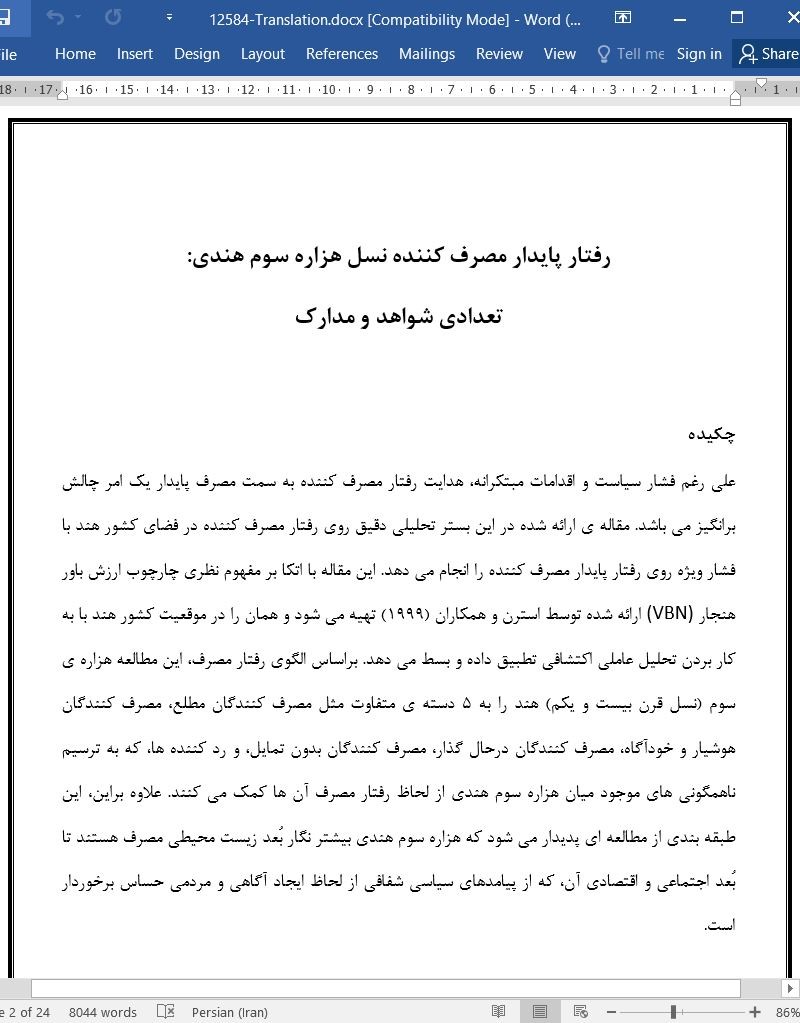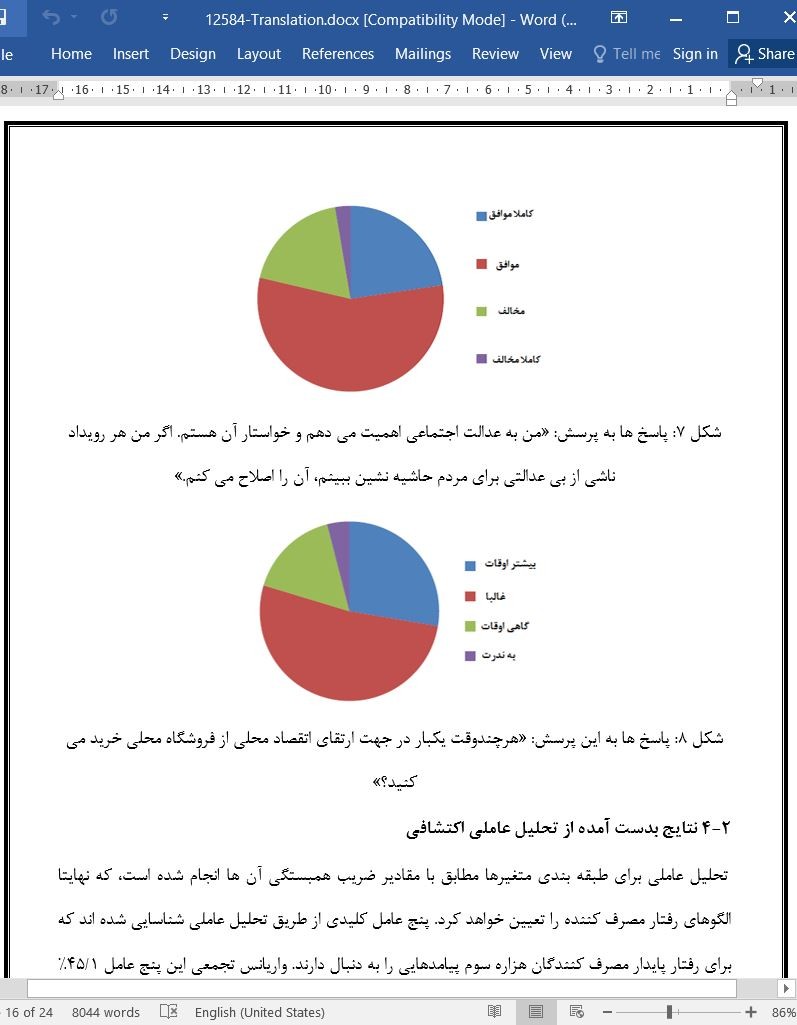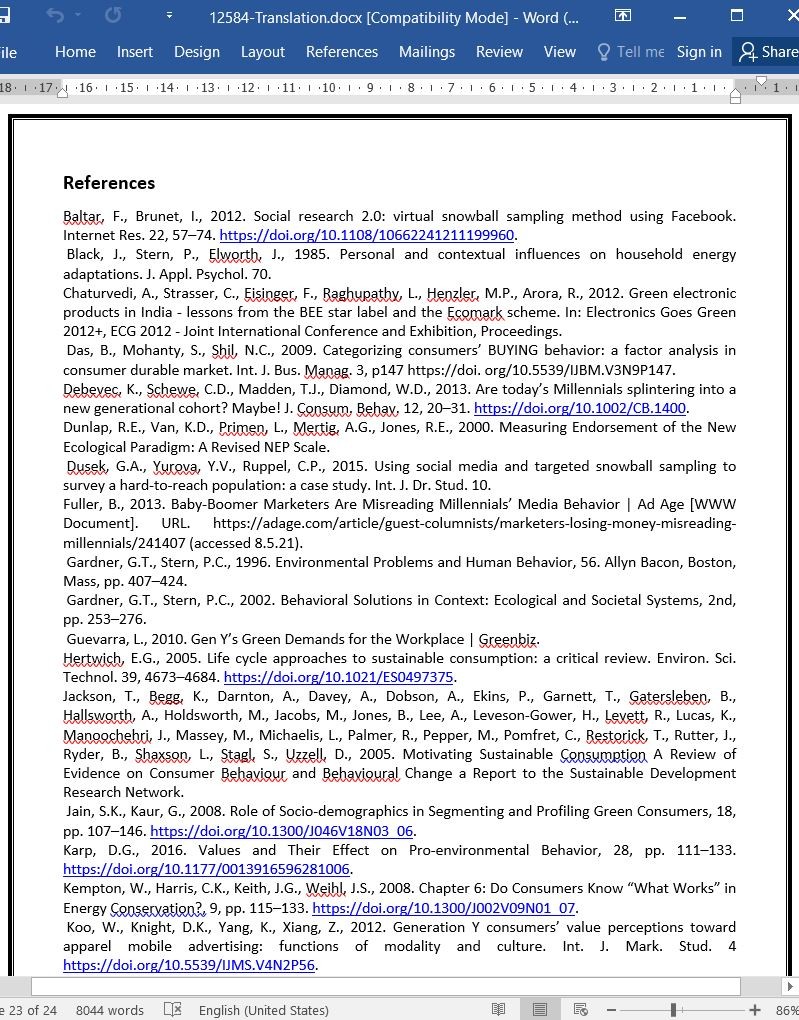
رفتار پایدار مصرف کننده نسل هزاره سوم هندی: تعدادی شواهد و مدارک
چکیده
علی رغم فشار سیاست و اقدامات مبتکرانه، هدایت رفتار مصرف کننده به سمت مصرف پایدار یک امر چالش برانگیز می باشد. مقاله ی ارائه شده در این بستر تحلیلی دقیق روی رفتار مصرف کننده در فضای کشور هند با فشار ویژه روی رفتار پایدار مصرف کننده را انجام می دهد. این مقاله با اتکا بر مفهوم نظری چارچوب ارزش باور هنجار (VBN) ارائه شده توسط استرن و همکاران (1999) تهیه می شود و همان را در موقعیت کشور هند با به کار بردن تحلیل عاملی اکتشافی تطبیق داده و بسط می دهد. براساس الگوی رفتار مصرف، این مطالعه هزاره ی سوم (نسل قرن بیست و یکم) هند را به 5 دسته ی متفاوت مثل مصرف کنندگان مطلع، مصرف کنندگان هوشیار و خودآگاه، مصرف کنندگان درحال گذار، مصرف کنندگان بدون تمایل، و رد کننده ها، که به ترسیم ناهمگونی های موجود میان هزاره سوم هندی از لحاظ رفتار مصرف آن ها کمک می کنند. علاوه براین، این طبقه بندی از مطالعه ای پدیدار می شود که هزاره سوم هندی بیشتر نگار بُعد زیست محیطی مصرف هستند تا بُعد اجتماعی و اقتصادی آن، که از پیامدهای سیاسی شفافی از لحاظ ایجاد آگاهی و مردمی حساس برخوردار است.
1- پیشینه
در اجلاس سران توسعه پایدار در سال 2015، کشورهای عضو سازمان ملل اهداف توسعه پایدار (SDGs) را برای عبور از مسیر پایداری اتخاذ کردند. هدف توسعه پایدار 12، در میان سایر اهداف، در مورد مصرف مسئولانه و تولید با هدف تغییر الگوی کنونی و ساختار رفتار مصرف کننده به یک الگوی پایدارتر صحبت می کند. به بیانی دقیق تر، هدف موردنظر 12.8 از هدف توسعه پایدار 12 بر روی ارائه ی اطلاعات مربوطه و افزایش آگاهی مربوط به پایداری و سبک زندگی مطابق با محیط زیست تأکید می کند. به همین ترتیب، هدف توسعه پایدار 12 (SDG 12) نیز اهداف مشخصی برای دستیابی به تولید پایدار دارد. برای نمونه، هدف 12.6 در مورد تشویق شرکت ها، به ویژه شرکت های فراملی و بزرگ به سمت اتخاذ شیوه های کسب و کار پایدار و ادغام اطلاعات پایداری با چرخه گزارشگری آن ها صحبت می کند. ابتکارات سیاسی متعدد در سطح کشور مثل افزایش مسئولیت تولیدکننده (EPR)، و اصل پرداخت توسط آلوده ساز (PPP) در کشور هند اعمال شده اند تا به سمت رژیمی از مصرف و تولید پایدار گام بردارند.
Abstract
Despite policy thrusts and initiatives, driving consumer behaviour towards sustainable consumption is a challenging task. The paper in this context carries out a detailed analysis of consumer behaviour in the Indian context with a specific thrust on sustainable consumer behaviour. The paper builds on the theoretical conception of the ‘Value Belief Norm (VBN)’ framework developed by Stern et al. (1999) and adapts and expands the same in the Indian context by employing exploratory factor analysis. Based on consumption behaviour patterns, the study classifies Indian millennials into five different categories such as aware consumers, conscious consumers, consumers under transition, unwilling consumers, and rejecters respectively, which help to map the heterogeneities present among the Indian millennials in terms of their consumer behaviour. In addition, it emerges from the study that Indian millennials are more concerned about the environmental dimension of consumption than social and economic dimensions, which has clear policy implications in terms of creating awareness and sensitising people.
1. Background
In the landmark Sustainable Development Summit in 2015, the UN member states adopted the Sustainable Development Goals (SDGs), to transit to a path of sustainability. SDG 12, inter alia, talks about responsible consumption and production aiming at transforming the current pattern and structure of consumer behaviour to a more sustainable one. In specific, Target 12.8 of Goal 12 of SDG emphasises providing relevant information and increasing awareness regarding sustainability and lifestyles in harmony with the environment. Similarly, SDG 12 also have specific targets for achieving sustainable production. For instance, Target 12.6 talks about “encouraging companies, especially large and transnational companies to adopt sustainable business practices and to integrate sustainability information into their reporting cycles”. Several country-level policy initiatives such as Extended Producer Responsibility (EPR), and Polluter Pays Principle (PPP) have been undertaken in India to transit to a regime of sustainable consumption and production.
چکیده
1- پیشینه
2- مروری بر کارهای پیشین
3- چارچوب تحقیق، روش تحلیل، و داده ها
3-1 چارچوب نظری
3-2 نظرسنجی، جمع آوری داده ها، و تحلیل داده ها
4- یافته های کلیدی و گفتمان
4-1 دیدگاه ها و اطلاعات کلیدی حاصل از تحلیل داده ها
4-2 نتایج بدست آمده از تحلیل عاملی اکتشافی
4-3 معانی ضمنی عوامل و توضیح آن ها
4-4 گروه های رفتاری در نمونه
5- نتیجه گیری
منابع
ABSTRACT
1. Background
2. Review of the literature
3. Research framework, method of analysis, and data
3.1. Theoretical framework
3.2. Survey, data gathering, and analysis
4. Key findings and discussion
4.1. Key insights from data analysis
4.2. Results drawn from exploratory factor analysis
4.3. Factor connotations and explanation
4.4. Behavioural groups within the sample
5. Concluding remarks
References
- اصل مقاله انگلیسی با فرمت ورد (word) با قابلیت ویرایش
- ترجمه فارسی مقاله با فرمت ورد (word) با قابلیت ویرایش، بدون آرم سایت ای ترجمه
- ترجمه فارسی مقاله با فرمت pdf، بدون آرم سایت ای ترجمه



